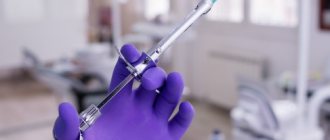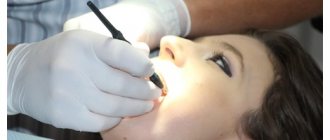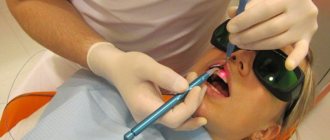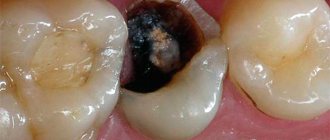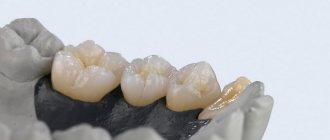Publication date: 01/25/2019 Update date: 08/13/2021
Author of the article: Shamray Olesya Vladimirovna Dentist
Sometimes expectant mothers refuse to visit the dentist because they are afraid of harming the baby. But modern technologies and medications make it possible to make treatment and tooth extraction absolutely safe. Let's dispel some popular myths and decide when you should see a doctor.
Why do teeth hurt during pregnancy?
A pregnant woman may become a frequent visitor to the dentist. This is due to several factors:
- increased acidity of the oral cavity due to toxicosis;
- changes in hormonal levels, and, as a result, changes and metabolic disorders;
- lack of microelements and vitamins in the body.
All this provokes the occurrence of caries and inflammation of the gums and mucous membrane; may cause pain. You should not endure inconvenience: the psychological state of a pregnant woman is no less important than her physical health.
The changes that occur in the body due to pregnancy can also trigger the development of dental diseases.
When should you see a doctor?
Preventative examination of the oral cavity in the early stages of pregnancy is mandatory even in the absence of unpleasant symptoms. If you suspect tooth decay or inflammation, make an appointment with the clinic as soon as possible.
The changes that occur in the body due to pregnancy can also trigger the development of dental diseases.
Most often pregnant women experience:
- Pain – even if it is mild and one-time, you need to visit a dentist. Usually this symptom indicates the presence of caries, which is easier and faster to cure at the initial stage. Then the doctor will be able to do without potent drugs that are contraindicated for pregnant women.
- An unpleasant reaction to too hot or cold food - increased tooth sensitivity signals damage to the enamel. If you consult a dentist in a timely manner, he will restore the tooth’s coating and protect it from destruction.
- The appearance of inflammation on the oral mucosa is an alarming symptom of the onset of an infectious disease, which can be dangerous for the woman and the fetus. Urgent diagnosis and treatment is required.
- Bleeding gums - this sign may indicate various diseases (periodontal disease, gingivitis, exacerbation of chronic problems) and requires urgent diagnosis.
If you suspect any dental problems, contact your dental clinic. It is imperative to inform your doctor about your pregnancy so that he can draw up a treatment plan and select safe medications.
Make an appointment
The order of appearance of baby teeth
The appearance of teeth has a strict sequence, which indicates the correct formation of the masticatory apparatus:
- At the age of 9-10 months, the first lower and upper incisors appear.
- Up to a year (up to 12 months), the second upper and lower incisors erupt.
- The first upper and lower chewing teeth will appear at the age of 12-19 months.
- Fangs erupt between 16 and 22 months of age.
- The child will acquire second upper and lower chewing teeth between 20 and 30 months.
In general, the process of teething is the natural course of things. And it’s definitely not worth accelerating it with mechanical influences. But it is possible to help a child survive it with the least discomfort. The first symptoms of teething may appear a month or two before the actual appearance of the tooth! To prevent a child from feeling discomfort all the time, there are many everyday tricks and even medications designed to relieve pain and inflammation from children’s gums.
“Painkillers” for teething in children: types, methods of use
To facilitate the process of teething, you can use various painkillers, local and general. What types of means are there and are there any restrictions on their use?
To make the process of teething as easy as possible, dentists recommend massaging the child’s gums. The gums are massaged for 1-2 minutes with gentle circular movements with clean hands, while the fingers are wrapped in a sterile napkin. In this case, Asepta napkins, made in the form of a fingertip, have proven themselves to be excellent. Extracts of chamomile and witch hazel in the impregnation have a soothing and anti-inflammatory effect on inflamed gums, reducing pain and swelling.
In addition, it is important to constantly wipe your baby's drool if it drips onto the chin to avoid irritation or rash there. Teething is accompanied by copious salivation; during this period the child must be carefully monitored.
It is necessary to constantly maintain contact with the baby, take him in your arms often and try to distract him with some activities. It is recommended to talk a lot with the child in order to “drown out” his pain.
During teething, you can offer your baby special teethers - toys of various ring-shaped shapes rubberized or filled with cooling thermogel. Before giving such a thing to your child, experts recommend cooling it a little in the refrigerator. But not too much, since the child will refuse very cold toys, and if he does not refuse, he may catch a cold due to contact with a surface with a low temperature.
If the baby refuses special devices for teething and prefers to chew something chosen independently, there is no need to prevent this. However, it should be borne in mind that the object that the child puts into his mouth must be:
- is devoid of sharp protruding parts so that the baby does not cut himself;
- without small parts that a child can “gnaw off” and swallow/chokes on;
- consist of a substance that will not harm the child upon contact.
Many children love to chew on bread crusts or bagels while teething. This is a rather dangerous activity, since the child may choke on crumbs or damage the delicate oral cavity with them.
What procedures are allowed during this period, and which are strictly prohibited?
Pregnancy imposes a number of restrictions on treatment, including dental treatment.
Acceptable:
- Treatment of caries, especially in the very initial stages. If the tooth is barely touched, you can even do without anesthesia. In case of increased sensitivity, use a spray with a minimal content of adrenaline.
- Fluoridation, enamel whitening. These manipulations are classified as absolutely safe procedures.
- Gum treatment. It can be carried out in any trimester using anti-inflammatory drugs.
- Installation of crowns and removable dentures. It will not harm either the expectant mother or the child.
- Removal of a tooth. At the level of modern medicine, it is considered a relatively safe manipulation for pregnant women, but it is performed in extreme cases
Forbidden:
- Dental implantation due to the need to take strong medications.
- Removing "eights". Severe trauma to the jaw occurs: a large wound surface can become a source of infection.
- Bite correction. During pregnancy, a woman's body loses a lot of calcium, so braces are likely to cause tooth decay. If pregnancy occurs already during treatment, it is interrupted until the birth of the child.
- Use of general anesthesia for pain relief.
Carrying out local anesthesia with special preparations containing a minimum percentage of adrenaline and calculating the correct dosages is not considered dangerous to the fetus.
Is it possible to take paracetamol during pregnancy for headaches, toothaches and fever?
Fever can occur for several reasons, the most common of which are flu and colds.
As for the flu, paracetamol is approved for use throughout pregnancy as the safest remedy with an antipyretic effect. In addition to it, in rare cases, some NSAIDs can also be prescribed according to indications, namely drugs with the active substance ibuprofen or celecoxib, but they are prohibited from being taken in the third trimester.
It is also worth noting that many combination cold and flu remedies include paracetamol. Although they are available without a prescription, these medications are contraindicated for pregnant women.
Influenza, caused by virus A, can cause fever in pregnant women. According to the clinical protocol for the treatment of this disease, elevated temperature should be controlled, since it jeopardizes the health of the fetus. To combat fever, paracetamol is prescribed, as it is considered the safest.
It should be noted that painkillers and antipyretics are prescribed at body temperatures only above 38 degrees. Pregnant women are prescribed paracetamol for hyperthermia at any stage of pregnancy.
A well-known pediatrician in Ukraine, Evgeniy Komarovsky, recommends pregnant women to be vaccinated against influenza in advance. He claims that in his entire medical practice he has not met a single pregnant woman who experienced complications after such a vaccination. Dr. Komarovsky also advises taking paracetamol at elevated temperatures, and if the temperature persists, seeking emergency medical help.
First trimester
The medication is approved in the early stages of pregnancy. Most studies show that the likelihood of developing birth defects in the first trimester of pregnancy due to influenza and fever can be reduced by taking paracetamol. It should be taken 500-1000 mg per day, but not more than 4000 mg per day.
In a review for the UK's Royal College of Obstetricians and Gynecologists, Dr Pat O'Brien , consultant obstetrician and spokesperson for the Royal College of Obstetricians and Gynecologists, says:
“Women who are trying to become pregnant or who are already pregnant should always check the mixture of ingredients in cough and cold products to avoid accidental overdose of paracetamol and any medicines containing the substance. We strongly encourage women to speak to their GP or midwife before taking any medications, including those available over the counter."
Second trimester
Since there is no clear evidence that paracetamol has any negative effects on the unborn child in the second trimester, it is approved for use. However, the medication must be used in the minimum allowable dosage and for a short period of time. But before taking the medicine, you should consult your family doctor.
Dr Sarah Stock, Senior Clinical Lecturer and Honorary Consultant in Maternal and Child Medicine at the University of Edinburgh, states:
“Pregnant women have few options for pain relief or treatment of fever, so paracetamol can be used under the strict guidance of a specialist doctor.”
Third trimester
Paracetamol can be taken to treat fever and reduce temperature throughout pregnancy, including the third trimester. Of course, there are results of some studies that talk about possible side effects of the medication for the unborn baby, but the data is relatively small and there is no safer drug for fighting influenza in pregnant women than paracetamol.
Andrew Shennan , professor of obstetrics at King's College London, says:
“Paracetamol is commonly taken during pregnancy and is considered safe and is indeed recommended for the relief of high fevers and mild to moderate pain. The use of paracetamol is advisable in late pregnancy. When in doubt, women should consult their doctor as alternatives may cause unwanted effects in infants."
Paracetamol can be taken by pregnant women in the 1st, 2nd and 3rd trimester to treat toothache, headache and lower fever. But before you start taking it, you should definitely consult with a specialized medical specialist.
But in some cases, paracetamol may not reduce the temperature. What can replace it? Read about the features of the drug and its alternatives in a new article .
What is better to choose when treating fever - paracetamol or ibuprofen ? Find out which drug is more effective and safe from the blog material.
Find out more about health at apteka24.ua .
This editorial material has been verified for accuracy by the family general practitioner of the Medical Plaza Medical Center - Galina Vasilievna Gubarenko .
Sources
Clinical protocol for the treatment of influenza and its complications in pregnant women / MedProsvita
Clinical recommendations. Flu in patients / Zdrav-nnov
Flu and Vaginism / MedCV.gov.ua
Influenza in pregnant and lactating women: relevant - about prevention, tactics and treatment / MedProsvita
Expert reaction to study looking at paracetamol in pregnancy and behavior, memory and IQ in children / SMC
Paracetamol / King Edward Memorial Hospital
Paracetamol / Drugs.com
Use of acetaminophen during pregnancy and risk of adverse pregnancy outcomes / PubMeD
RCOG review clarifies pain relief options for women during pregnancy and breastfeeding / RCOG
Analgesics and pain relief in pregnancy and breastfeeding / NPS Medicinewice
Prenatal paracetamol use and asthma in childhood: A systematic review and meta-analysis / ScienceDirect
Headaches in pregnance / HSE.ie
Treating pain during pregnancy / NCBI
Increased risk of preeclampsia after use of paracetamol during pregnancy – causal or coincidence? /BMC
Association of maternal prenatal acetaminophen use with the risk of attention deficit/hyperactivity disorder in offspring: A meta-analysis / Sage Journals
Pregnancy/ADA
Cold and flu during pregnancy / pregnancybirth&baby
Denial of responsibility
apteka24.ua provides comprehensive and reliable information on issues of medicine, health and well-being, however, diagnosis and choice of treatment methods can only be made by your attending physician! Self-medication may be unsafe for your health. apteka24.ua is not responsible for possible negative consequences arising from the use by users of apteka24.ua of the information posted on the site.
Is it possible for pregnant women to have dental x-rays?
Pregnancy is not considered a contraindication for dental radiography. Images are taken using computer radiovisiographs, which deliver a very small dose of radiation. The woman’s body is covered with a special protective apron, and the radiation beam is directed towards the jaw area.
However, such a procedure should be performed only when absolutely necessary and should be limited to taking pictures of one or two teeth. Long-term planned treatment, which periodically requires radiography, is best postponed until the birth of the child and completion of breastfeeding.
What to do if your tooth hurts during pregnancy and you can’t get to the doctor
For starters, you can drink something painkiller. Paracetamol is considered the safest. Unlike other analgesics, if the recommended dosages are followed, it will not harm the fetus.
Before meeting with your doctor, you can also try to reduce pain with warm rinses. For this, decoctions with an anti-inflammatory effect are used: oak bark, sage, chamomile. You can rinse approximately once every one and a half to two hours.
Severe pain is relieved with novocaine applied to a tampon and applied to the gum in the area of the diseased tooth. However, this method should be used with caution during pregnancy. In any case, you cannot self-medicate; you should quickly see a dentist.
Sign up at Clarimed at any time convenient for you, we work around the clock. Call: +7 (495) 316-96-16 or sign up at klarimed24.ru. If the pain is severe, we will try to see you immediately.
During pregnancy, you need to fill your diet with calcium-containing foods: milk, cottage cheese, cheese
Are painkillers harmful during pregnancy?
18.10.2018
Every pregnant woman should take her medications responsibly. Naturally, many expectant mothers wonder whether it is possible to take painkillers during pregnancy . Indeed, during this period pains of various origins may bother you, and it often happens that the pain is simply impossible to endure. Let's figure out which drugs are allowed during pregnancy and which ones should be avoided.
What painkillers are allowed during pregnancy?
A woman should know that severe pain in the position cannot be tolerated. Therefore, it is necessary to take analgesics in order not to suffer from pain for a long time. But along with the emergency use of an analgesic, it is necessary to remember that pain is a signal of trouble. So when women experience pain, they should consult a doctor to find out the cause.
So, pregnant women can use (do not forget that taking medications must first be discussed with your doctor!):
- Paracetamol. WHO has recognized that this drug is the safest drug during pregnancy . It has no long-term side effects. At the same time, paracetamol is also an effective dental pain reliever during pregnancy , which has a lasting effect;
- Nurofen. It can be taken until the 30th week;
- Papaverine. The product quite effectively eliminates pain by relieving spasms;
- No-shpa. It is a safe and effective antispasmodic, eliminating pain of various origins.
- Ibuprofen. The product effectively fights pain.
When anesthetizing your teeth , you must remember that pregnant women should not keep them unhealthy, and therefore if you have a toothache, you should consult a dentist .
When are pain relievers prohibited for pregnant women?
There are a number of medications that pregnant women should not take if they have pain. So, if you don’t know what painkillers you can take during pregnancy , you need to consult your doctor .
So, the following drugs are prohibited during pregnancy:
- Analgin. It is not without reason that he received a kind of “palm” among unwanted drugs. And not by chance. It has been proven that regular use of this drug during pregnancy threatens irreversible changes in the blood . This negatively affects the condition of the fetus. There may also be disturbances in the functioning of the liver and kidneys .
- Baralgin and spasmalgon. They can also cause changes in kidney .
- Ointments based on bee or snake venom. They are prohibited because they can cause allergies , and some of their components are harmful to the fetus.
- Dimexide-based ointments are also prohibited for use by pregnant women.
- You should not take products based on essential oils, as some of them can cause miscarriage.
In addition, there are a number of diseases for which painkillers cannot be taken. These include:
- ulcerative pathologies of the gastrointestinal tract;
- asthma ;
- liver diseases ;
- kidney dysfunction ;
- allergic reactions.
Pregnant women should know that if side effects, in particular allergies , occur while taking analgesics, they should be discontinued and consult a doctor . This is a must.
Published in Pregnancy and pregnancy management Premium Clinic
